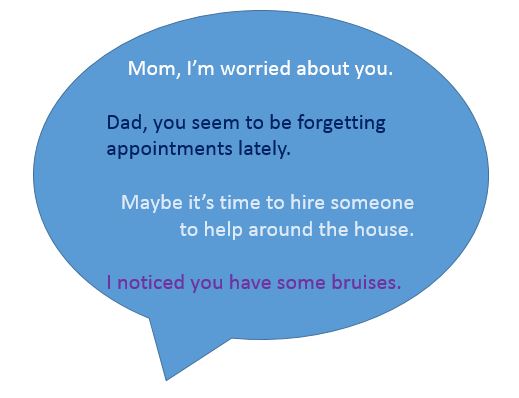Our experts are often called upon to help families discuss difficult topics. We work with many adult children on how to approach these subjects, how to be prepared for the discussions, and what not to do. Many times our care managers even help to mediate such discussions.
Today, we’ll delve into talking to aging parents about assisted living, getting help at home, and your worries about their health or memory problems.
How to Talk to Aging Parents about Health or Care Concerns
Many families we talk to tell us that their loved one denies any concerns about their health or care needs. Adult children sometimes find it hard to get any information out of Mom or Dad about their health or doctor’s appointments. Others have long conversations filled with health complaints but may become frustrated when their solutions are repeatedly rebuffed.
The first step in talking to aging parents about such concerns is early involvement and regular communication. Be prepared with proper advance care/legal documents. Make sure your parent has completed paperwork with their medical providers permitting access to their health information (and/or has an updated Florida Healthcare Surrogate Designation permitting the designee to receive protected health information and help with decisions at any time). Discuss who will help and how this might work. If possible, start attending some doctor’s appointments with your loved one (or hire a care manager to attend and coordinate). This helps you to better understand their health picture and spot changes early.
As things change or specific concerns arise, don’t wait to have the conversations. Discussing options early and planning ahead gives you some peace of mind and provides your parent with more control. When it’s time to have these conversations, set aside plenty of time to talk. Allow your parent to share their feelings and have input. Come prepared with resources and ideas.
If you are having trouble with health conversations, try to schedule/attend a doctor’s appointment with your parent. If possible, fax or email a letter to the doctor explaining what you’ve observed and your questions. Regarding care needs, an objective care management assessment can help and a care manager can approach the client as an ally.
Talking to Aging Parents about Memory Problems
This is very similar to discussing other health problems or care needs, but with added sensitivity. It can also be more difficult if your loved one has cognitive problems which make it hard to remember or process the discussions.
It is best to approach this with sensitivity and simple, concrete examples. Suggest an evaluation as a way to make sure everything is okay. Don’t create unnecessary fear by pre-diagnosing the problem. A memory clinic or specialist is best for this type of evaluation, and should also be sensitive in dealing with the patient. The evaluation gives you the best starting point for discussions about what needs to be done next.
Talking to Aging Parents about Assisted Living or Home Care
Closely tied in with the above issues is the need to discuss getting some help. You’ve likely already spotted some concerns if you’re reading this, but here are some important signs your aging parent needs help.
Make note of these concerns and the areas where you think your aging parent could use some help. They may see things differently, so listen to them for clues as to what worries/bothers them. Maybe you worry about Dad’s safety, but he worries about shopping and cooking meals. Mom’s personal care may be in decline but perhaps she fears keeping up with the household tasks or wants help driving to her church group at night. When talking to aging parents about assisted living, focus on the positives that can make life better based on what matters to them.
To be prepared for talking to your parents about getting help, we highly recommend Ten Ways to Convince Parents to Accept Home Care Assistance. Personalize the approach to your situation and your parents’ personality and motivations.
Talking to aging parents about assisted living brings up a whole host of emotional and practical issues. The home itself has a lot of meaning and history. Your parents may feel overwhelmed with the process of moving…and rightly so. Tackle one aspect of the conversation at a time and come prepared to help with the logistics.
You’d be amazed how often a small logistical issue or practicality is the biggest sticking point in moving. So, be sure to listen carefully and don’t dismiss anything your parent says. Don’t try to handle selecting and moving to assisted living by yourselves. Bring in some help for the myriad tasks, from selling the home and belongings to picking the right place and reviewing the contract, to the specific tasks of moving day and ensuring a smooth transition.
Contact us for help with talking to your aging parents about assisted living and other concerns. Our care managers can also guide you through transitions, offer resources, and coordinate the process of moving to assisted living or hiring home care.

 Popular Downloads
Popular Downloads


 Get Our Newsletter!
Get Our Newsletter! Mission Statement
Mission Statement

